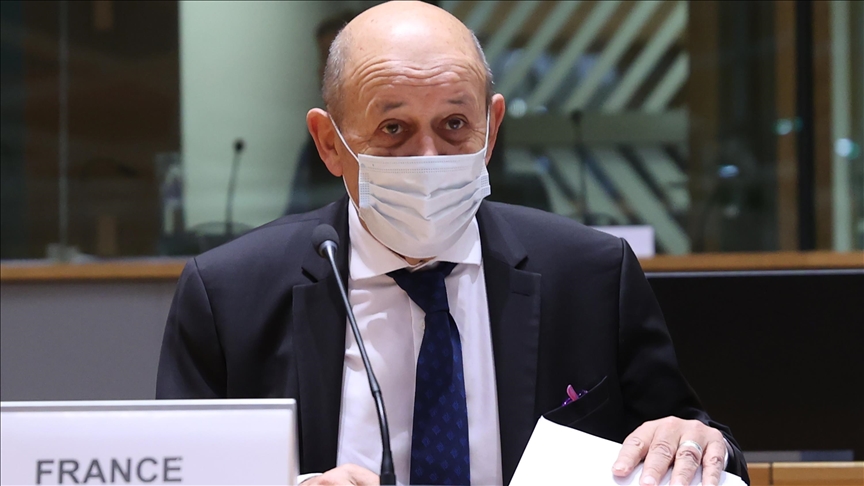French foreign minister calls Putin ‘dictator’
Jean-Yves Le Drian warns Moscow of nuclear alliance that is NATO

PARIS
French Foreign Minister Jean-Yves Le Drian called Russian President Vladimir Putin a “dictator” Thursday in a scathing attack for reneging on his commitment not to launch a military intervention against Ukraine.
Responding to a question on whether Paris felt deceived by Putin’s abrupt change of stance, Le Drian told TF1 Info news they were aware of the massive risks.
“We knew that there was an accumulation of forces on the borders in Ukraine. We knew that there were all the risks of a massive offensive, which has just taken place, and that is precisely why we went to Putin, to avoid war.”
However, despite agreeing with French President Emmanuel Macron to de-escalate tensions through political and diplomatic negotiations, the Kremlin had "violated Russia’s signature because the actions taken are in breach of the commitments” to the international treaties.
By choosing to strike militarily, Putin trampled upon the 1990 Charter of Paris for New Europe signed in the wake of the fall of the Soviet Union and has ensured stability on the continent and the 2015 Minsk agreements, he said.
“He also turned back on the personal commitment (made to Macron)...He is a cynic and a dictator,” Le Drian said.
Following his visits to Moscow and Kyiv, Macron had secured a commitment to a cease-fire in the Donbas region. He had also proposed a potential summit between Putin and US President Joe Biden that could pave the way for a “new order of peace and security in Europe” on the condition that Moscow would not invade Ukraine.
Responding to Putin’s veiled threats to his opponents with "consequences you have never experienced before," Le Drian said the Russian president must understand “that the Atlantic alliance is a nuclear alliance."
He said all the measures imposed against Russia are massive, spectacular, heavy and will be very effective.
“The proposed sanctions will be massive; they aim to asphyxiate the economic functioning of Russia."
Donbas crisis and Russia's military intervention
The February 2014 “Maidan revolution” in Ukraine led to former President Viktor Yanukovych fleeing the country and a pro-Western government coming to power.
That was followed by Russia illegally annexing the Crimea region and separatists declaring independence in the Donetsk and Luhansk regions of Donbas in eastern Ukraine, both of which have large ethnic Russian populations.
As clashes erupted between Russian-backed separatist forces and the Ukrainian army, the 2014 and 2015 Minsk Agreements were signed in Moscow after the intervention of Western powers.
The conflict, however, simmered for years with persistent cease-fire violations.
As of February 2022, some 14,000 people have been killed in the conflict in eastern Ukraine.
Tensions started escalating late last year when Ukraine, the US, and its allies accused Russia of amassing tens of thousands of troops on the border with Ukraine.
They claimed that Russia was preparing to invade its western neighbor, allegations that were consistently rejected by Moscow.
Defying threats of sanctions by the West, Moscow officially recognized Donetsk and Luhansk as independent states earlier this week, followed by the start of a military operation in Ukraine on Thursday.
Putin said the operation aims to protect people “subjected to genocide” by Kyiv and to “demilitarize and de-Nazify” Ukraine, while calling on the Ukrainian army to lay down its arms.
Anadolu Agency website contains only a portion of the news stories offered to subscribers in the AA News Broadcasting System (HAS), and in summarized form. Please contact us for subscription options.







